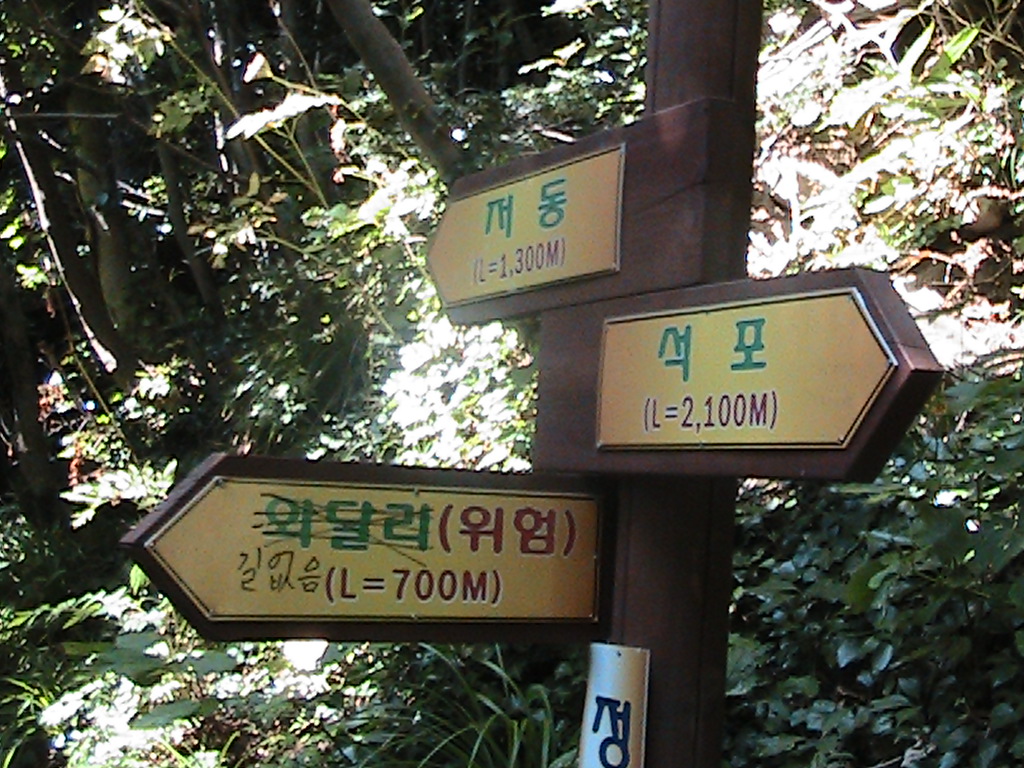I keep telling myself that if my Korean is going to improve, I need to try harder to read things. I frequently puzzle my way through parts of newspaper headlines or articles, and I’ve learned a lot reading advertisements, but such forms of “found Korean” won’t be available to me when I return to the US. So I’ve been telling myself I should buy some actual books in Korean to try reading. It is perhaps too ambitious, given the pathetic level of my vocabulary — but I’m pretty good at working out the grammar as long as I have a dictionary in hand.
In one final visit to the bookstore today, I bought what looks to be a late-elementary or middle-school level text of Korean history, that I might try. I also found an abridged translation of Don Quijote (돈키호테 = don-ki-ho-te). I remember when I was first trying to learn Spanish, I would sit down and try to read, in Spanish, books I had read before in English. So what better first text to sit down with in Korean than a translation of something I know very well in Spanish?
Category: Banalities & Journaling
Caveat: I said some goodbyes to students today
… I felt a bit melancholly. And they complained, of course, about the new teacher. But I remember when they were complaining to the previous teacher about me, too. Such are students… they get used to something, and then the changes are always a bit hard. Nevertheless, I will miss them greatly.
I tried to work on editing a little video of Ulleungdo today, but I was getting perfectionistic and wasn't happy with what I had. I think I will start over. Sorry.
I've been making a lot of lists, lately. Lists of things I need to do or buy (before leaving Korea, after getting back to the states, if-and-when I return to Korea — those sorts of lists). But also, perhaps I mentioned, trying to list "good things" and "bad things" about Korea, in an effort to help myself decide whether I really want to return here or whether I would rather do something else, next, with my life. I don't like the idea of being "flighty" about things. I like the idea of "sticking to" something. So, what, exactly, am I sticking to by returning to Korea after some length of break. And, is it something I really want to stick to? If so, why? Are there better things to take on and stick to?
Caveat: War. Conflict.
I went to the Korean War Memorial and museum in Seoul today. I've never been there, although I came close to going a few times. It's interesting to go there for me, in part, because it's sited on land that was still part of the Yongsan Garrison (US Military command base in Korea) when I was first here in 1991. Being in the Yongsan area always makes me have strong recollections of when I was here in Korea in the Army.
The museum had a few interesting aspects. I actually enjoyed the displays on the first floor, about earlier Korean military history (i.e. back from 19th c. and earlier) than about the Korean war. Modern state nationalism and ideology-driven conflicts, in all their manifestations, often leave me feeling rather negative about the human condition. I suppose the earlier stuff is more interesting because it's less relevant… I can kind of look at is a broad swathe of almost literary background, which is always the way I best enjoy reading history, I guess.
I've had people asking me for "more videos." I have lots of "footage" (kind of an outdated term in the age of gigabytes of storage on harddrives or USB sticks), but I need to put some things together. Maybe I'll work on something tomorrow. I'm going to visit my former job and say a final goodbye to some of my students and coworkers in the afternoon, but hadn't really decided on something for the morning yet.
I've been feeling rather conflicted the last few days about "Korea." What I mean, is that I have been pretty sure I want to come back, and I have some solid opportunities to do so, to work. But I keep playing lists in my head: positives about Korea in one column, negatives about Korea in another, and it's too evenly balanced. And there are other adventures to be had, elsewhere in the world.
How strong is my interest in, and acknowledged passion for, the Korean language? How willing am I to accept those many annoying aspects of Korean culture, in my pursuit of the language?
Caveat: Some pictures from Ulleungdo
Here are some still pictures. I didn’t actually take that many, because I was too busy playing with my video camera. Not sure how to balance that out, yet.
The first is from Cheonbu harbor (center of the north coast) looking west toward the Chusan outcropping. Straight west past that is South Korea. Northwest, to the rightish, is North Korea. Exactly north, to the right, is Vladivostok. And behind is Japan. All off across the sea, of course.

The next is from the southeast coast, between Dodong and Jeodong on the walk to the Dodongdeungdae.

These are some boats in Dodong harbor.

This is the view of Dodong from the ferry terminal. Cute town.

This is the “no road existing” sign that made sure I didn’t get lost.

This is the island of Jukdo, off the northeast coast. According to a guidebook, it is inhabited by 3 families and their cows (which have to journey to and from the island using slings into and out of boats to get up and down the cliffs all around it). I want to visit this island.

This next is from somewhere along the northeast stretch of highwayless coast. I liked the tree very much.

And here are a few from my cellphone camera (much lower resolution).
Here’s a buddha next to a modernist cartoony statue of various sea-denizens that are part of Ulleungdo’s identity.

Here’s a temple wall that has a very striking picture of a sea-dragon amid the waves. It was a gorgeous painting but didn’t come out so well on the cellphone camera due to the lighting and resolution.

Here’s the excursion ferry arriving at Dodong from Dokdo. I nearly went to Dokdo myself, but the mobs of nationalistic Koreans rather put me off.

You see, Dokdo is a tiny outcropping of rock (less than 1 square kilometer) that juts out of the water about 90 km southeast of Ulleungdo. It is claimed by both South Korea and Japan, though it’s currently controlled by South Korea, and as far as I can tell, they have the most valid claim: since medieval times Dokdo has always been grouped with Ulleungdo administratively, so whoever “owned” Ulleungdo also was considered owner of Dokdo, regardless of whether the “owners” were ultimately the Japanese emperor or the Korean king, depending on epoch.
Right now, there is a huge nationalist fervor in Korea, provoked by recent ambiguous but typically in-denial-of-history mumblings by some Japanese ministry or another. The government and the media powers-that-be are encouraging all Koreans to believe firmly that “Dokdo is ours!” You can even get “Dokdo” t-shirts at Dunkin Donuts. Nationalistic geo-fetishes always make me uncomfortable, as historically they often seem to lead to bad (read: violent) outcomes.
![]()
Caveat: ah, bus stations…
I'm in the Pohang bus station, and found a PCBang inside it. I have bought a ticket for DongDaegu, which is the Daegu city express train terminal, where I will buy a train ticket back to Seoul. I thought of buying a direct bus ticket (it's only 5 hours), but I decided to make the journey a little more interesting by going intermodal. Everyone knows how I am about the maximal enjoyment of all forms of public transportation.
Caveat: 섬더덕 제리
I’ll make this a short entry… I have to catch my ferry back to Pohang. I went around to Chusan and Cheonbu again this morning, and also rode the cable car to the top of the hill here in Dodong. Mostly just wandering-around-sightseeing, as I tend to do.
Ulleungdo is famous for the things it makes with pumpkin, among other things, and although pumpkin is not normally one of my preferred tastes, they have these pumpkin jellied candies (섬더덕 제리) that are pretty good. [Correction!–dated 2009-09-17–섬더덕 is not pumpkin, but rather Codonopsis lanceolata (see wikipedia). I was confused because the woman selling to me was confused, but a friendly man on the ferry back from Pohang enlightened me. Anyway, I like the candies a lot, and probably the fact that it’s not pumpkin explains why.] I have bought some bags of them to take back to the LBridge kids, if I get a chance to pass them out on my last goodbye visit next Monday/Tuesday.
I’m pretty sure I’m headed back to Seoul tomorrow. Not that there aren’t tons of other places in Korea that I haven’t seen and that I would love to see, but I have a week left, at this point, and although I lived in Seoul (well, suburbs) for two years, there are a lot of toursity things I never got the chance to do. This will be my chance to explore and get to know a bit better the city that’s been my home.
Caveat: Clockwise. Counterclockwise.
I went around the island of Ulleungdo twice today.
First, to make up for the viewless and deckless ferry ride across, I decided to get one of the "round the island" ferry excursion tours that are offered. Well, first thing in the morning, I walked out to the 도동등대 (dodongdeungdae, a downright stunning mouthful of frustrating Korean vowels, which means Dodong Lighthouse… actually, I think "Dodong" just means "island town"). That took about an hour. Then I got on the excursion boat at 9 and rode it around the island, which took about 2 hours. The boat was crowded with tour-group people, mostly large tribes of middle-aged and older Koreans, shoving and pushing and chatting and yelling and picnicking and taking each other's pictures. I tried to stay out of everyone's way. I noticed they had a second boat full of teenagers (middle schoolers or highschoolers on "school trip" most likely), so I probably should consider myself lucky. Then again, teenagers are more likely to be sociable with "foreigners" like me, as they are too young to care what the foreigner might think or say. But, the scenery was fabulous. So, that was "clockwise" around the island.
Then when I got off the boat, I got on a bus to 저동 (Jeodeong), which only took about 10 minutes. And I began walking. The island had no roads until 1976, only trails and round-the-island ferries. The government has been developing the island, and they've managed to complete about 80% of their island-circling highway. The northeast quadrant, between Jeodong and Seokpo, roughly, is not yet built. So, to go around the island by land, one has to walk at least this stretch of it. There are some stretches of highway of the "road to nowhere" variety because they don't connect to any town properly, and there's not bus service for that reason. So I had to walk about 5 km of highway and about 4 km of rough mountainous trail. There was a lot of up and down. But unlike in Busan, I'd remembered to get a big plastic water bottle, and I didn't feel lost — I followed the right signs, including one which memorably read "길없음" (gil-eops-eum = "no road existing" and pointing to the left, which therefore convinced me to take a right even though it was against my intuition of the moment. So, I didn't get lost. And by 3:30 pm, I was in Cheongbu, where I could catch a bus back around the north, west, and south sides of the island and back to Dodong, which is on the southeast corner. That was counterclockwise. It was a great day. I'm tired.
I took some video of both trips, and when the battery on my camera ran low, I took some pictures with my cell phone (which isn't allowing me to make calls, unfortunately, but which I still carry for it's handy pocket-watch and korean-english dictionary functionality). I'm not posting any pictures, from here, however, as I have to get things loaded across to my computer, and then, preferably, I should try to find a place where I can wifi directly online and not have to transfer to a USB stick to upload on a public computer.
So anyway, that was my day in Ulleungdo. I think it's the most beautiful place in Korea that I've seen, and it's in my top ten list of most beautiful places anywhere.
Caveat: … or not off the grid?
I should have known it wouldn't be easy to escape (or leave behind) civilization… especially in crowded Korea.
I'm on Ulleungdo, and I just couldn't resist popping into the PCBang (Korean style internet cafe) just up the street from my pension. Yes, they have PCBang in Ulleungdo. Sigh.
Pohang is a depressing, charmless city for the most part. But I walked the length of it, from the bus station to the ferry terminal, and saw more fish for sale (mostly still wiggling) than I ever thought possible, at the market. The city is famous as Korea's "steel town" (a kind of Pittsburgh by the sea, I guess) but that's all a recent development of its history — 50 years ago it was just a generic east coast fishing village.
The ferry crossing was… stunningly boring. Once again, even though this wasn't a hydrofoil, passengers were not allowed on deck. And my seating section didn't even have windows. It was like spending 3 hours in a shaking, rocking, rolling room full of 300 hungover and picnicking Koreans. Hmm. Next time, remind me not to be stingy, and to instead go ahead and blow the extra 7 bucks for an upgrade to First class, where, apparently, at least they have windows.
But landing at Ulleungdo Dodong harbor and stepping out was like stepping into a movie set. This verdant, tiny island fishing village, with hawkers and sellers and the entire day's worth of departures and arrivals for the island's only transport connection to the world bustling around the dock. I had read in a guidebook that people will accost all obvious tourists (which I am no doubt one, given my complexion and physiognomy if nothing else) with offers of lodging at the various pensions and hotels to be found in the town (of about 5000, I think).
I took up the first ajumma (older Korean woman archetype) to make me an offer — entirely on the criterion that she obviously knew no English whatsoever. Finally, someone who will force me to speak Korean with them. She wasn't very chatty as we walked up the street to her pension (two rooms in the back of her storefront that she rents to travelers), and her price seemed steep, compared to the guidebooks, but still less than the generic hotel I'd stayed at last night in Pohang.
But she unleashed a monologue of discussion (what did I want to eat, I got that) when I'd gotten settled in my room and come back out to go off exploring. "뒤에" [later], I said, but I wasn't sure I was using the right word, until another ajumma came by on the street and yelled at my proprietess "뒤에! 뒤에!" and added something to the effect of "just listen to him, he said later."
I still probably wasn't using it quite correctly. But at least I wasn't completely off the mark.
OK, I'm off. In theory, given I showed I can do a 15 km hike in about 5 hours in Busan, on Saturday, I could walk around this island in a day (well, a long day). According to the guidebook, it's 73 square kilometers. That's a pretty small island. I don't think I'll try that. More later.
Caveat: Off the grid?
I'm taking the bus to Pohang today, and the ferry to Ulleungdo tomorrow. I'm not expecting to find convenient internet connections (although you never know, these days), so, I may not be posting for a while. I've posted at least once for every single calendar day this year. I'm really amazed at this record. I'll try to keep it up, by back-posting for the days I'm off the grid. I'll be back on mainland Korea next thursday at the latest, or maybe sooner if Ulleungdo proves disappointing or frustrating or unbearably boring. And who knows, these days, and in the land of broadband internet connectivity, I might just find easy internet there, too. My guide book is a few years out of date, and these things change fast.
Caveat: Long Walk
I took the subway to Haeundae and walked around. Haeundae is Busan's famous beach neighborhood, made more famous by the recent blockbuster Korean-made disaster movie of the same name, that's been the big summer blowout hit in Korea this summer. Anyway… I decided I wasn't that interested in the beach. I walked west, and noticed a sign for a trail up a mountain called Jangsan (장산). I thought, oh, what the heck. Busan is littered with mountains kind of similar to the way Seoul is (or Los Angeles, for that matter), and the city kind of sprawls around them. It's almost a Korean urban archetype, that's dictated by the peninsula's topography.
I walked up the trail, and realized I'd only brought one small bottle of water, which I finished quickly. I became thirsty. And it was longer than I expected, although not that much… about 2 kilometers from the trailhead, I would guess. But all uphill. Very tiring. I was hoping someone would be selling water at the top of the mountain. If it had been Japan, there would have been vending machines — Japan has more vending machines than people, I think. I did, actually, find a vending machine not far from the top of the mountain, but it was only for lousy instant coffee. I didn't buy any. I headed back down.
I misread a sign (and I wasn't carrying my guidebook or map, which is kind of a tendency of mine when I'm out being a random wandering tourist). And so I got a little bit lost. Not really lost. I knew where I was, when I came to the next sign. But it turned out I'd gone down the back of the mountain. That meant I could either go back over the top of the mountain (4 km), or go around the mountain on a trail I saw on the map on the sign. I opted for the latter, because it seemed less strenuous.
When I had walked back around the mountain in a bit of a circuitous way, I ended up well to the east of where I'd started, and so I had to walk through some neighborhoods to get to the subway station that was closest. Net result: I walked a lot — I would estimate about 15 km from subway station to subway station, total. I bought some gatorade at a convenience store. It was a good hike, and I took some pictures from the top of the mountain (and a small amount of video, but I'm running out of storage space for video). I'll try to post some later.
Tomorrow, I'm going to Pohang, not far northeast of here, from which I take the ferry to Ulleungdo. Ulleungdo is a small island in the middle of the East Sea (called the Sea of Japan on most western maps, but calling it that is against the rules while in Korea). It's quite isolated, and I've long wanted to visit it.
Caveat: I carry a flower carefully
I was walking around Fukuoka two days ago. I saw the words “I carry a flower carefully” inscribed like a very short poem on the side of a big truck. I wanted to write an ode to the side of that truck. Or, maybe, I wanted to write an ode to postmodern commerce. Or, maybe, I wanted to think about writing an ode, and then stop, before the ode appeared, all wilted and unloved, like an uncarefully-carried flower.
Instead, I wrote the following in my little librito para pensamientos aleatorios.
I imagine that in the back of that truck, there is a single flower. It is a bit limp, in the dark strangling air and the stiffling heat of the back of that truck. It is a single flower, strapped down tightly and carefully so that won’t slide around in its tiny flower pot. It is alone in the otherwise empty cargo bay of that truck.
We all carry important things. Life has so many details.
Too many choices amid too much freedom can create its own class of suffering? I shake my head. The September sun is hot in Fukuoka. There are no clouds.
It seems like I have no goals. Isn’t life, and growing up, supposed to be about process? Sometimes the lack of goals can create feelings of anxiety, but I then try to remind myself that goals are hazardous. They are hazardous because… well, not precisely… but, they lead to disappointment.
I think sometimes that such a goallessness must seem odd, or even bewildering, to others who see it in me. I frequently make up goals and tell them to people, but these made-up goals are often shifting around like sand under the waves creeping up a beach. Sometimes I carry a goal that I have made up around with me, carefully, for a long time. But I never forget that I made it up to please someone, during some conversation. It’s an illusion.
People seem to find me difficult to understand.
Is it really suffering, having so much freedom? No. It’s maybe an irrational fear of emptiness. I carry a center of loneliness. I don’t comfort it. I simply carry it, carefully, and some day, in some metaphysical market, maybe I can trade it to someone who needs it more than I do. That person might give me some strong, desirable currency, or a kernel of enlightenment or understanding, in exchange.
The details in life matter, but they are so easy to neglect. Other people matter. I’m not always very good at connecting.
Caveat: Traveling Alone
Last night felt like a disaster.
I was already feeling moody and gloomy after my ferry ride back to Korea. Riding the ferry wasn't like a boat ride (which I love). Because it was a high-speed hydrofoil (I've only ever ridden a ferry like that a few times before), you can't go out on the decks, you basically sit strapped in your seat for 3 hours. I should have signed up for the 10 hour regular ferry, maybe. Riding the ferry was like sitting in a taxying airplane for 3 hours. And while on the ferry, they showed a really depressing tear-jerker movie about some little boys with cancer. It was a Korean movie, with Japanese dubbing, but it was pretty easy to follow the plot. Lots of emotional, teary moments. I actually get pretty strongly affected by such things, I think.
So I was moody. And I was returning to Korea, which was a bit like coming "home" but not really. Partly because I'm always going to be an alien in Korea, no matter how long I spend here. But also because I'm only going to be traveling around a bit, and then really leaving to return to the US. So I was feeling melancholic because it was a bit like it was going to be a goodbye tour.
The hotel I found and checked into seemed alright, at first. But it was really unpleasant. I should have run the other way when I found a complimentary can of RAID in the closet. And there was a neon sign outside the window. And the air conditioner didn't work. Etc., etc. I'm too stubborn (or stingy?) to just write off the money spent on lodging and find something better, and I'm too shy, especially with my disappointing language skills, to argue about things or complain about things to the management. Being a loud, complaining customer is really hard for me.
I got fixated on having some bibimbap for dinner (since I'd come back to Korea). So I found a place that sold bibimbap and ordered some for take out (포장해 주세요…). They clearly understood what I wanted, but apparently weren't the sort of place accostomed to giving take-out. They tried to insist that I stay and eat, but… I was feeling melancholy, as I said, and was really fixated on just taking it back to my room and eating in my private gloom. I was remembering many meals of take-out that I would get from the place near my apartment and take back to eat alone. I really don't like eating in restaurants alone (except maybe fast food joints), I always feel uncomfortable. That's why when traveling alone like I am, I tend to eat a lot of take-out and carry-out type things (although still trying to avoid too much fast food — at least American-style fast food).
So anyway, the woman at the restaurant was actually having a conversation with me. And at one level, I was surprised, because she was attempting to do it in Korean, and I was attempting to answer in Korean, and it was going back and forth, although with some (a lot of) confusion. Why was this surprising? Because this almost never happens. It's one reason learning Korean is so difficult: Koreans don't like to try to talk Korean with foreigners. They must think it's impolite, or frustrating, or … who knows what. It had already happened to me more than 5 times just in the short time between disembarking from my ferry and getting to this restaurant: I attempt to start some kind of exchange in Korean, and I get this bewildered, puzzled look in response, as the look up and realize I'm a foreigner, and they either couldn't understand what I'd said, or that they could but it wasn't the expected English (which they often can't understand either, but at least they understand why they can't understand).
It's so different from Japan. The Japanese always talk to you in Japanese. Even after they see that you're a foreigner. They only ever switch to English if you explicitly ask them to, or persist with several answers in a row in English. Because of this, while in Japan I had more "conversations" (such as they were) in Japanese over 10 days than I could've had in Korea over several months. That was another depressing thing about Korea, coming back from Japan. How can I ever learn Korean when Koreans refuse to speak Korean with me? Perhaps the contrasting Japanese behavior displays a sort of underlying cultural arrogance (it's a bit like the French are reputed to be, right?), but from a language-learner perspective, it makes things so much easier.
Here I was, then, having this "real" conversation in Korean with a Korean restaurant lady, and she's badgering me to eat in her restaurant, and I'm being stubborn because I have this fixed idea that I wanted to eat my bibimbap alone in my crummy hotel room. So she starts chatting about other things as the kitchen staff prepares my take-out. I'm American, yes. I was in Japan, and came back. And wow, most of it is in Korean. I'm feeling mildly please. Then she says, hey, you've got a bit of a paunch. Pointing at my gut.
Now… this is typically Korean, too. This business of openly and flatly commenting on the physical characteristics of strangers. Not always positively, either. "Gee, teacher, you have a lot of gray hair," is something I've heard more times than I can count. And not just students… strangers on the subway, or whatever. I know and understand that for Koreans, it's a way to make conversation – once you get past the awkward first steps (the must-knows: age, place of origin), all topics are open game. It's not meant to be offensive, although I suppose even Koreans would agree it's kind of "low-brow" to make random, negative observations about the physical characteristics of just-met strangers.
So I grinned and agreed. Too much bibimbap, I tried to say. I don't think I said that right. She seemed annoyed I'd returned to the topic of the food (which was a lost battle, for her). And then my food was ready, and I said thank you very much and took it back to my hotel room. They had their revenge, however — there was neither spoon nor chopsticks in the take-out bag (although it was quite delicious and was exactly what I'd been craving). Nevertheless, I ate it guiltily. Because of the paunch.
I've always felt like I could stand to lose a bit more weight, and that just hammered it home. I watch my quantity of food intake pretty carefully, normally, and I walk everwhere. Living in Ilsan, I even fell into and out of and into and out of the habit of going jogging. At my best, I'd go 3-4 times a week, other times, I'd miss a few weeks.
But I've maintained my weight pretty well since losing all that weight back in 2006-7. Still, I could stand to lose more, right? And, I've got a bit of a paunch. Probably, traveling around, despite the huge amount of walking everywhere, I've gained a bit, because I don't have the same kind of discipline for intake: I see something delicious in my touristic meanderings, and I buy it and eat it.
So that made me depressed, as I lurked in my stuffy, mildew-smelling hotel room and tried to go to sleep. I was feeling all kinds of remorse: for deciding to leave Korea (although that's reversible); for failing to learn Korean (this is my hugest bugaboo, probably, given it was always one of the main "reasons" for coming here in the first place); for failing to watch my weight; for not just giving in to the restaurant lady and eating in her restaurant, like she wanted; for trying, yet again, to travel alone, even knowing that rarely works out well for me.
And why is it, anyway, that I travel alone? Well, because that's who there is to travel with. Michelle and I had many things we used to fight about. But we were amazingly compatible, when traveling together. Those were the wonderful times. We never fought about things related to traveling: if we fought while traveling, it was about other things (like that unforgettable knock-down-drag-out argument about Aristotle vs Plato on the drive back from Winnipeg to Minneapolis, one time). We had the same way of traveling: no plan, just go out and look and explore. I miss traveling with Michelle very much. And now, like most of my life, I travel alone. Because traveling is too important to me, and too much fun for me, not to do it; but traveling alone sometimes really depresses me, too.
Caveat: 지금 부산에서 있어요
I’m back in Korea, in Busan. Still no wifi in my hotel room… I came wihtout a plan, kind of blase about where I would stay. This place is a bit of a dump… then again, it’s cheaper than even the cheapest place I stayed in Japan. So all values are relative, in travel-expense terms.
I’ll be in Busan for a few days. I’ve scoped out some better possibilities for tomorrow night. Meanwhile, I’ll save the long, detailed posts for later. Byez.
Caveat: 9/9/9
Well, that's an easy date to remember. I was going to go to the Fukuoka Asian art museum today but it was closed. So I wandered around in the afternoon. I saw the ACROS building (I'll post video of it when I can get a cheaper internet connection), it's actually a bit famous, architecturally. ACROS is perhaps famous, but I actually recognized it from a cartoon — haha. One of my favorite Japanese anime series is the absurdist Excel Saga, which is based in a slightly fictionalized (or a lot fictionalized) version of Fukuoka. It's very strange to be recognizing a cityscape from a cartoon. I also saw the Fukuoka Yahoo! Dome — yes, that Yahoo!, which is big in Japan. And Fukuoka is a bit of a software city, maybe a sort of Japanese, subtropical Seattle? And a big shopping mall. And many Starbucks. OK… more later.
Caveat: Fukuoka
This will be very short, because I'm on a public computer. I'm in Fukuoka. Tomorrow, I'm returning to South Korea by ferry. Here, there are a lot of signs in Korean, actually… which makes sense, since it's basically Japan's border city with Korea… it's where the car ferries cross to Busan.
Caveat: “The Bullet Train from Tokyo”
This is the other video I made where I started with the song and added the video bits I'd recently taken. The lyrics to the song ("Hammering in my Head" from Garbage's 1998 Version 2.0 album) include the phrase "the bullet train from Tokyo" and I'd always imagined, someday, I would be on a bullet train from Tokyo, and lo, last Saturday, I was. So I made this little video, and, fortunately, this time, youtube allowed my "third party copyrighted content" — so you all can see it.
It's funny, because youtube communicates with me in Korean (not always very successfully, I might add, but I can get the gist). I can't figure out how to change the setting that makes it do this. Here's what it told me about this posting:
caveatdumptruck님,
회원님의 동영상 "The Bullet Train from Tokyo"에 UMG님이 소유하거나 라이센스 권한을 갖고 있는 콘텐츠가 있을 수 있습니다.
별도의 조치를 취할 필요는 없습니다. 그러나 회원님의 동영상에 미치는 영향에 대해 알고 싶으면 계정의 콘텐츠 ID 일치 섹션을 참조하시기 바랍니다.
Sincerely,
– YouTube 고객지원팀
I like the "caveatdumptruck님" [honored caveatdumptruck]. And the "Sincerely" in English — what's with that? I wonder if it's going through some kind of automatic translation software.
I'm still puzzling about what to do about my other, disabled video. I'm searching for a different song that I like that I can match to it, that youtube might allow… but, since I deleted the raw source footage that I used to make the video (to make room on my hard drive), my options are limited. Ah well. It was no big deal, really.
Caveat: Mayhem in the park (no external soundtrack required)
I was walking back to my inn and had about a block to go, and came across some highly organized mayhem in a little park. I think everyone was practicing for an upcoming parade or cultural exhibition. There were kids, moms dispensing drinks and pointing kids to restrooms, men drinking water from large plastic buckets and giving each other commands, and lots of mayhemical musical instruments. I'll let you make what you want of it, yourself – I was entertained. When it ended, I walked back to my ryokan. And here I am.
Caveat: DRM and antifandom
So, I made a video and tried to post it, with a song that I really like. I didn't really think about copyright issues… I've seen so many homemade videos to preexisting songs on places like youtube, that I really thought the issue was resolved as a sort of "fair use." Obviously not. Youtube disabled the video I uploaded because it detected "copyrighted material" – ie the soundtrack to the video I made.
My reaction: 1) I have to find a different song. 2) I'll have to rethink adding songs to my videos, in general – but, my life has always had a soundtrack, and I was thinking how totally cool it was to be able to "share" that life-soundtrack with others, and now I can't always do that, which leads to 3) some weird, residual anger at the artist in question – why can't I use her song to show the feeling or mood I have associated with my homemade video? Do I have to go through the rigmarole of getting permission? It's not even a matter of money – I'm sure the money is insubstantial. It's the inconvenience. Do I want to remain a fan of an artist that makes my life annoying and inconvenient? Maybe not. Now, when I hear that song, instead of thinking the reflective, deep, philosophical thoughts I previously associated with it, I'll be getting grumpy thinking about DRM and why she wouldn't let me use her song on my amateur video, in what I thought was a thoughtful, respectful way, including crediting the song at the end (as I've been doing). So I doubt that song will remain on my mp3, either. Maybe that artist just lost a fan. Is that what DRM (in all its manifestations) is supposed to do?
Youtube offered me the option of replacing my audio track. But the whole point of the exercise was that I thought I'd come up with a video that matched the song in question in mood and atmosphere. What are the chances I'd find such a song in their weird random library of "licensed" tracks? Further, as youtube notes, "Note that advertisements may be displayed on videos that contain soundtracks from the AudioSwap library." Oh, goody. Not that I have anything against advertising… it's what makes most of the internet free, after all. But, I just don't feel like attaching random advertising to this video.
Outcome: the video won't be posted. Sorry.
Caveat: Tourist
For day, I was a pretty conventional tourist. I took a day trip out to Miyajima (also called Itsukushima) and Mt Misen. I rode the streetcar out to Miyajima-guchi and then the 10 minute ferry across to the island, and walked around the famous main shrine complex. I ascended to the top of the mountain for the fabulous view. I saw deer and monkeys and many, many humans (including women climbing steep, several-kilometers-long mountain paths in 3 inch spike heels — ah, Japan!). It was very hot. I drank a lot of water along with randomly selected beverages from the ubiquitous vending machines, and ate a shrimp-cake yakitori (or something like that, anyway) on the way down at the end.
I don't really have a lot of patience with being a conventional tourist, but I tried. It was worth seeing, I think — it was a sort of "just like the postcard" experience. I made more video… I now have so much that I will have to delete some or I won't have room to store it on my computer. I'm going to try to make one of shinkansen ride and one of my visit here to Hiroshima. Maybe I'll work on it tonight.
I actually kind of like not having internet access in my room. It keeps me from lurking in there rather than getting out and exploring. I've had that epiphany before, actually. Having internet access where one sleeps is a mixed blessing, for someone like me who has issues with self-discipline.
Caveat: Hiroshima
I am in Hiroshima. About 3 blocks from ground zero. Weird.
But… Very cool city. You know how it is, with some places, you just know they will be cool? I have always felt that way about Hiroshima. And… yep. I suppose that is why I decided I needed to include this place on my brief Japan tour.
My little ryokan (japanese style inn) that I reserved and arrived at has no wifi, so I had to go visit a PC bang (er… that would be the Korean name, not sure exactly what the correct slang term is here), for the first time since coming to Japan. I will go scavenging for free wifi somewhere, tomorrow. More later.
Caveat: Tokyo
I'm not really happy with this video, but I didn't spend much time on it. I had trouble syncing the music track to it, but I really wanted to use that song. Anyway, here's some random shots of Tokyo over the last few days.
Tomorrow, I leave on the shinkansen for Hiroshima. I'll post from there, I guess. I hit a few art museums, today. Definitely worth it… I love art museums. The visits got my mind working. I'll see if I can write some thoughts or observations… but no promises.
Now I'm resting in my little hotel room and watching bad Japanese TV and trying to rememorize my kana. It's weird, because over the past year I've been working on learning Korean hanja, which are the equivalent of the Japanese Kanji, and every time I try to read a sign, I pronounce the kanji in my mind in Korean, which doesn't work well with Japanese endings. Not that I've really got that huge a vocabulary… I probably only have a hanja/kanji recognition of around 50 characters at the moment.
[Song with the video is Japanese Punk group Last Alliance's "Shissou"]
Caveat: After 3 days in Japan, I got around to planning my trip to Japan today
I had a productive day. I found an ATM where I could withdraw directly on my Korean bank account (thus avoiding paying double foreign exchange premiums by having to use my American-based credit cards: won-to-dollar then dollar-to-yen). I finally found a hotel more to my liking (both cheaper and more akin to my sensibilities – still not a ryokan as I'd originally planned, but no longer a faceless business hotel either). And I bought tickets for my train travel around Japan, thus making commitments to where I will visit and for how long. I'm mostly going to focus on the southwest (Hiroshima and Kyushu) since my intention is to return to Korea by ferry. Maybe on my next visit to Japan I can do Kansai and northern Honshu, and even Hokkaido someday!
Then I went exploring, some more. I saw the Imperial Palace and walked around Akihabara, the capital of the otaku ascendancy (otaku is a Japanese word meaning something like "geek" or "nerd," although not exactly).
I think I've finally figured out why I've been having periodic headaches since coming to Tokyo — it's nothing so alarming or banal as air pollution or allergies — it's caffeine withdrawal, of all things! I shoulda guessed. I had a pretty reliable 3-4 cups a day (always before late afternoon so as to not interfere with sleep habits) while living / working in Ilsan. And since coming to Japan I wasn't following that routine. But today I had two cans of canned cold coffee around lunch time, and behold, no lingering headache. Hmm.. I remember when Michelle used to have caffeine withdrawal headaches, too. I guess it's a relatively harmless habit, as bad habits go.
Caveat: Languages
Yesterday I went to the Meiji Shrine, among other places. It's kind of a big almost wilderness-y park just a few km south of Shinjuku. Quite stunning and beautiful inside. I took some video… maybe I'll try to process and post it, later.
Anyway, when I first got there (after walking the wrong way around to the "back" entrance, as per my obtuse, instinctive, anti-touristic custom), I found myself having a short exchange with the guard at the entrance, since there didn't appear to be any signs with English making clear I was at the right place. Nothing fancy, mind you: Is this the Meiji Shrine? Yes. Thank you.
But I realized that I was managing the exchange in not-too-bad low-level Japanese. The guard definitely seemed impressed. That's a tribute to my 20-years-ago Japanese teachers at the University of Minnesota, I suppose. Still, I immediately felt very frustrated and almost angry: the "trying-to-learn-Korean-for-over-2-years Jared" suddenly was very jealous and resentful and pissed off at the "haven't-even-looked-at-Japanese-in-20-years Jared," because that was an exchange that would have still given me anxiety in Korean (although I think I might have managed it).
I can meditate on various reasons and excuses why I find Korean so difficult. There's the mind-bogglingly weird sound system (I mean, not in absolute terms, but to us English speakers). There's all those Chinese-origin homonyms (what happens when you borrow 4 words that are identical in pronunciation, except for tone markings, into a non-tone language?). But the reason that's probably most likely, but that's hardest for me to accept, is that apparently there's a big difference between my 20-something brain and my 40-something brain. I've commented on this before. Oh well. Maybe I should just study Japanese, since it seems to come so much more easily to me?
But… I like Korean. Do I like it because it's so hard for me? Am I a linguistic masochist? Hmmm.
Caveat: being in places
I often tell people that, more than anything else, I love to travel. But actually, I hate traveling. I love being in places, and then wandering around.
The other parts of travel, it turns out, I'm stunningly bad at doing: planning ahead, organizing, economizing, packing, scheduling, etc. Mostly, when I travel, I just dispense with these things to the maximal extent possible. But, here in the world's most expensive city, that habit of mine has a pretty high price. Not that I'm complaining. I've fully accepted that my aversion to planning ahead when it comes to travel means I pay a little (or a lot) extra for things like accommodation. But actually finding a place proved more difficult that I expected. Is Tokyo full? Hmmm… sorry, that's a rhetorical question. Actually, I would say, Tokyo's pretty much full. Megalopolis of megalopolises. The metamegalopolis.
I spent a major portion of yesterday simply wandering around. As I do whenever I'm in a new city with a subway system, I deliberately went into the subway without studying the map, got what seemed like a useful ticket (a one-day pass) for 710 yen, and walked to the first platform and got on the first train. And after about 20 minutes, I saw fields. Fields? What kind of megalopolis is this, anyway?
Obviously, I'd gone off in a centrifugal direction. So I got off and found that my little ticket made the ticket gate complain beepingly. You see, I'd managed to get on a JR train that exited the "Tokyo Metro" system. Somehow, the regional rail and the subway here don't exist in their seperate, delimited universes, the way that such things do in other major cities I've been to. So you can ride a subway train that indetectably transmogrifies itself into a regional rail route once it crosses the outside edge of the metro system. Hmph.
I paid the friendly and utterly English-free station guard the make-up fee for the incorrect ticket, and walked around my randomly discovered neighborhood. Then I bought a SUICA pass (which appears to work like Seoul T-Money — my fingers are crossed that will continue to do so) and went back to Ikebukuro where I started. After I'd figured out that first lesson in Tokyo subway navigation, things went smoothly. And what better way to learn subway navigation than through trial and error? That's why I do things that way, I suppose… aside from the fact that for me, personally, it also happens to be fun.
I went and saw the Diet building and government area (there were tons of riot police about, which made it feel just like Seoul's government area — perhaps because of the recent elections?), then I spent a long time walking around Ueno and later Shinjuku. Just exploring, as is my wont.
Today will be museums day (at least, that's the plan… as I said, plans don't work well for me when I travel).
Tokyo seems more "western" in some ways, than Seoul. More multicultural, though still nothing like Western cities. But also… there's a tiredness about the people here. Where Seoulites seem frantic and hectic and even chaotic, Tokyoites seem more just "heads down" pushing ahead. Not moving slower, but there's a kind of ennervation in the air. The subway trains are eerily quiet (there's a cell-phone use ban, apparently, among other rules), unlike the raucous way that crowded subway cars in Seoul can sometimes seem. Then again, it's easy to forget that Japan has basically been in something close to economic recession for 20 years. 20 years! In that period of time, Seoul has probably doubled its GDP. That kind of contrast is bound to affect the psychology of the inhabitants.
When I walk around, I often rely on the sun to keep my orientation and find my way back to somewhere familiar. I think I must be odd, in this respect, at least among postmodern urbanophiles. And it can really mess me up, when the sun goes down or hides in overcast skies. Last night, I became very disoriented trying to find my hotel after taking the wrong exit out of the subway station (the station in question has almost 70 numbered and lettered exits!). I wandered into a nieghborhood of pachinko parlors and love hotels, and was accosted (politely) by hustlers, one Japanese and later a Nigerian (I think).
Finally, I found a Starbucks, and thinking it was one I'd walked past before, because it was next to a Mizuho bank, I headed confidently in what I thought was the right direction. Alas, it was not the right direction. I didn't get back to my hotel for another 20 minutes, because I had to double back, go back into the subway station at yet a different enterance, navigate underground for several blocks, and then go out by a more familiar entrance. Beware trying to use a Starbucks as a landmark. That's the stupidest thing I've ever had to re-learn the hard way…
Caveat: The Kids
I finished putting this together, this evening, lurking in my hotel room in Tokyo. It’s not perfect, but I’m pretty happy with it. It will help me remember my 14 months at LBridge pretty vividly, I think. Great kids!
The song is from the children’s musical that Zina was in, that I went to see six months ago. Keep in mind that I “lengthened” the song by looping the 2nd chorus about 4 times so that it would match the length of the video – so don’t be alarmed if the thing seems a bit repetitive. Thematically… I’m not sure it’s a great match: I think it’s about about a mosquito who’s bemoaning the current environmental crises in the world. But I like the song, and I think it goes well with the kids, especially since one of the kids in my video is actually one of the voices performing the song.
Caveat: You should follow the rule
Here I am in Tokyo: a fairly high-end hotel in the Ikebukuro area, because I like my first night in a completely new place to be utterly convenient. I'll get adventurous after I get my bearings.
The flight was without incident. There was an unpleasant man on the airport bus from Narita into the City. He complained I was hitting the back of his seat. He said, in a loud, rude, tone, "Don't touch my seat." Then, after a minute or two, he scrawled on the back of an envelope the words "You should follow the rule" and held it up so I could see. I hadn't even been touching his seat after that first complaint.
Hmm… welcome to Japan. And… which rule is that, anyway? And… I only had hit the back of his seat twice, on accident, as I was looking for my hotel reservation papers in my bag on my lap. Well, whatever. The contrast: on a Korean airport bus, chances are, everyone would have been bonking everyone's seat, as energetically as possible, and only getting offended if someone became annoyed at that. So. But I'm trying to be recovered from that.
There was a friendly woman who was returning from a first visit to Seoul to her home in Tokyo. I chatted with her for a while. I asked if she liked Seoul. She said, "oh, it's like a small Tokyo."
Indeed. From that tiny, provincial megalopolis of only around 15 million, I get to visit the real deal, with double the population. Cool. What's it with me and big cities?
OK, I'm tired. I will sleep, now.
Caveat: “an unsatisfied feeling”
In about 24 hours, I'm flying from Seoul to Tokyo. I'm saying goodbye to my job at LBridge, but only a very brief farewell to Korea.
The plan: 2 weeks in Japan, 1 week back in Korea as a tourist, then to Minneapolis. After that… road trip (Chicago, Denver, Phoenix, LA, Humboldt, Portland — big circle). Expecting a month or more pause in LA, though. After that… ? Back to Asia, most likely. Looking at Vietnam, Tawain, Mongolia, and/or back to Korea. I'll have to see what sorts of opportunities turn up. It's best when all is in flux…
And here's why I really like this teaching thing. I feel like I'm promoting myself by sharing this, but this letter I received from a student really touched me, and affirmed why it is I like trying to be a teacher so much. Here it is, mistakes-and-all:
Hi, teacher. I'm Shaina.
I write this letter because I want to give expression to thanks.
For the past six months, thank you very much. I was very shy, and I have no confidence about English. But you were bring conviction to me, so I gain confidence about English. Untill now, I announced many speech. But always I was tremble and wobble, but teacher was always praise me. So I can get good scores. And you teach our very funny and interesting. So I always respect you. But you will go will go back to America. So I have an unsatisfied feeling. And I'm sad. ^^
Even though you go back to America, I will not forget you. Thank you, teacher. and good-bye.
from Shaina.
Caveat: An Almost Korean Breakfast
Yesterday was my last day at work, and I came home feeling sad and tired. Of course, I made no progress in packing, last night. I basically just read for a while, finally finishing the first of the 6 or so "books-in-progress" that I was hoping to finish before moving out. I doubt I'll actually finish the others. The book I finished was a desolate piece of Korean-Lit-in-translation called Three Days in That Autumn, by Pak Wanseo. Hemingwayesque, spare prose, that may be partly an artifact of translation, but well-written for all that. Unfortunately, there was a bit of an annoying subtext, a kind of anti-abortion screed, with a dash of evangelical Christian redemption thrown in for the last few pages. Then again, the take on it all was sufficiently ambiguous that there could have been some intended irony, too. It would be hard to decide, if I had to work it through "semiotically."
I woke up this morning and gazed around my cluttered, packing-up-in-progress apartment. It's frustrating, if not downright embarrassing, to find myself harboring vague home-decorating fantasies so close to my day of departure. I satisfied them by cooking the last of my brown rice, and then ate it with the last of my excellent cucumber kimchi. Except for the fact of it being brown rice, that's a totally traditional Korean breakfast, and I've grown to find it very appealing. A simple, completely sugar-free and fat-free breakfast.
Caveat: 나는 전지전능해
My student Anastasia wrote “나는 전지전능해” on her workbook cover. She translated it as “I’m almighty” but the dictionary suggests “I’m omnipotent” might be a better translation. In any event, it shows a lot of self-confidence, huh?
Saying goodbye to all the kids is hard. Then there are the moments when I just have to laugh, too. My student Brian (3rd grade) put on a very serious face and said, “teacher, I wrote you a letter.” He handed me an index card. I turned it over, and read a single word: “~bye”
My student Paul (4th grade) came up to me right after the end of class and spontaneously hugged me. That was great, but it wasn’t so great when he immediately poked me (well, gently) in my gut and said “I will miss your stomach soooo much.” Maybe that’s a sign I need to lose a bit more weight?
Lastly, I got the following card from Sally. She did the cover art herself, obviously inspired by my many alligators. I was touched by what she wrote.

![]()
Caveat: What about Gitmo
The Obama administration has proven disappointing in lots of ways, so far, although it's early to pass judgement. But one thing I'm surprised about is how stymied they seem over the Guantanamo issue. There was a proposal by someone named GUÉNAËL METTRAUX in a recent New York Times that seemed like a plausible and workable solution to the dilemma created by Bush et al.
In a side note… I may have to stop reading the New York Times online… more and more, I'm getting "you have to pay for this section" or "you have to be registered for this section" notifications. It's annoying. I quit reading the Washington Post for a similar reason. Everyone says… well, papers have to support themselves. True. But sitting in South Korea, it's not necessarily convenient to have some kind of online subscription to a website, given unreliable access issues (due to being inside Korea's weird, unpredictable national firewall, and having a crappy DSL provider, among other things). So I just shop around for what's convenient, I guess.
Caveat: Trip to the bookstore
I played with my new video camcorder today, and took a trip to Seoul, and then spent the last 4 hours trying to learn how to load and edit. The result is my first edited video, ever! Of course, very amateurish. But you can see my world "through my eyes" as I take the subway into Seoul for the afternoon. I can see how playing with this stuff can become addictive.
Caveat: Are you devil?
I use my cellphone as a stopwatch in class when students are giving speeches. Further, I occasionally allow the students themselves to be “timekeeper” for a given other student’s speech. This means my students are often playing with my cellphone. It doesn’t really bother me, although more than once, I’ve gone back to it later and found its most recently used application was something under the “game” heading — I rarely play games myself on the cellphone because, since it’s a Korean cellphone, it tries to help me play the game with instructions in Korean. I did once manage to get a 37% score on a quiz game entirely in Korean, basically by viewing it as a linguistic abstraction game.
 So… I was pulling photos off my cellphone last night, and found the following. I have no recollection of when this photo might have been taken. Is it flattering? I’ve definitely been making a lot of use of my plastic black and red pitchfork (lower left of photo), lately.
So… I was pulling photos off my cellphone last night, and found the following. I have no recollection of when this photo might have been taken. Is it flattering? I’ve definitely been making a lot of use of my plastic black and red pitchfork (lower left of photo), lately.
I don’t know how to put on the fancy frame, either. But whoever did this picture of me apparently had no problem not only surreptitiously taking this snapshot but then managing to add the fancy frame without my having a clue. I think it was a time when they were brandishing their own cellphones and I was hamming a little bit, so it’s not like I wasn’t aware of having my picture taken. In today’s modern (Korean) classroom, it’s ubiquitous, and something I accept as a matter of course. I suppose that technically, there are rules banning the use of cellphones in class, but I view such rules as both reactionary and irrelevant, and rarely enforce them except maybe during quizzes or when they’re clearly proving too distracting.
…
“Are you devil?” Gina asks, every time.
“Maybe,” I hedge. It’s all part of the schtick, right?
Every teacher needs a schtick. Or a fork. And a coupla alligators (made in China).
![]()
Caveat: Each Day…
I've been trying to decide if I will continue my monomaniac effort to post to this diary each and every day, after I cut myself adrift. It will be less convenient to continue doing so — I imagine a search each evening for a PC방 (Korean internet game room) or the local equivalent wherever I am. I've never been good at keeping up habits in the face of inconvenience. One of the favorite creative bits of language I've ever run across in any of my EFL students' writing was Ella's "inconvenience is the mother of invention." So what would I invent? No need, here. I can always "post date" / "pre date" my blog entries. But that kind of feels like cheating. Well, it's of no major consequence, actually.
Yesterday I had a student giving me a long, drawn-out excuse for unfinished homework, involving diarrhea and visits to the doctor, apparently. I would have preferred the abridged version, to be honest. But it did expose me to some unexpected vocabulary in Korean, and thus, as tends to be the case, I made it into a "teaching moment." I don't know it it was appreciated. But whatever.
Not-so-random notes for trying (still trying, only trying) to learn Korean
자신 = self-confidence, confidence -하다 to have self-confidence
할아범 = old man (according to dictionary)
할아범탱이 = not in dictionary, my students tell me it means senile old man
전염 = infection
변비 = constipation
설사 = diarrhea
모든 = each, every, all, whole
